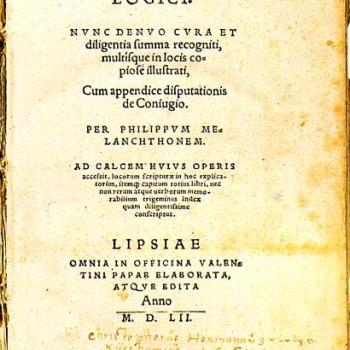
Romans 6:22 (RSV) But now that you have been set free from sin and have become slaves of God, the return you get is sanctification and its end, eternal life.
Protestantism formally separated sanctification from justification in a way contrary to the Bible. Justification saves through faith alone, according to their view. Sanctification and good works, on the other hand, are definitely encouraged and regarded as necessary in the Christian life, but are not a cause of either justification or salvation; only God’s grace and our faith accomplish that. This is the classic Protestant “faith alone” doctrine, or sola fide in Latin, and one of the two “pillars” of the so-called Reformation, along with sola Scriptura (“Bible alone”).
The above passage contradicts this understanding, by directly tying salvation to sanctification. If “eternal life” is the “end” of sanctification, as St. Paul writes, then it’s impossible to separate sanctification from salvation. This verse and 2 Thessalonians 2:13 are perhaps the two clearest and most decisive refutations of “faith alone” in the New Testament.
Here are some other translations of Romans 6:22:
Amplified Bible . . . you have your benefit, resulting in sanctification [being made holy and set apart for God’s purpose], and the outcome [of this] is eternal life.
New American Standard Bible . . . you derive your benefit, resulting in sanctification, and the outcome, eternal life.
New International Version . . . the benefit you reap leads to holiness, and the result is eternal life.
Moffatt . . . your gain is consecration, and the end of that is life eternal.
Barclay . . . you are on the way to holiness, and the end of that road is eternal life.
Weymouth . . . you have your reward in holiness, and eternal life as the result.
Today’s English Version . . . your gain is a life fully dedicated to him, and the result is eternal life.
***
“Please Hit ‘Subscribe’”! If you have received benefit from this or any of my other 4,600+ articles, please follow this blog by signing up (with your email address) on the sidebar to the right (you may have to scroll down a bit), above where there is an icon bar, “Sign Me Up!”: to receive notice when I post a new blog article. This is the equivalent of subscribing to a YouTube channel. Please also consider following me on Twitter / X and purchasing one or more of my 55 books. All of this helps me get more exposure, and (however little!) more income for my full-time apologetics work. Thanks so much and happy reading!
***
The context of the passage has other “Catholic verses” and references to works and sanctification as processes involved in salvation, which isn’t instant and not completely separated from works at all:
Romans 6:16-19 Do you not know that if you yield yourselves to any one as obedient slaves, you are slaves of the one whom you obey, either of sin, which leads to death, or of obedience, which leads to righteousness? [17] But thanks be to God, that you who were once slaves of sin have become obedient from the heart to the standard of teaching to which you were committed, [18] and, having been set free from sin, have become slaves of righteousness. [19] . . . For just as you once yielded your members to impurity and to greater and greater iniquity, so now yield your members to righteousness for sanctification.
Romans 6:21 But then what return did you get from the things of which you are now ashamed? The end of those things is death.
The parallelism of 6:21 with 6:22 is clear: the “end” of sin is death (damnation), whereas the “end” of good works and “sanctification” is eternal life. Hence, sanctification is directly tied to salvation and attainment of heaven. I don’t see how it can be otherwise. The word “faith” never even appears in Romans, chapters 6-8. The emphasis is on obedience or disobedience to God.
Romans 8:16-17 it is the Spirit himself bearing witness with our spirit that we are children of God, [17] and if children, then heirs, heirs of God and fellow heirs with Christ, provided we suffer with him in order that we may also be glorified with him.
Here is how some of the classic Protestant commentaries grapple with Romans 6:22:
Calvin’s Commentaries: Sin in this life brings the torments of an accusing conscience, and in the next eternal death. We now gather the fruit of righteousness, even holiness; we hope in future to gain eternal life. [my italics]
Calvin tries to disconnect the parallelism between Romans 6:21 and 6:22, noted above, in order to make it fit with Protestant theology, by using the word “hope.” But the text is clear and straightforward: sin leads to death; sanctification leads to eternal life. They can’t be separated. It can’t be spun and rationalized to make out that good works and sanctification are purely optional in the equation of who gets saved in the end (eschatological salvation).
Ellicott’s Commentary for English Readers (Anglican):
Your fruit is the new Christian life which leads on to sanctification and finally to eternal life. . . . In spite of your sanctification as Christians, still you will not have earned eternal life; it is the gift of God’s grace.
Catholics don’t believe in works salvation (i.e., we agree with Romans 6:23). We believe in the “both/and” biblical outlook. Salvation is wholly from God’s grace in the final analysis, but it’s not without our willing participation; working with that grace. Hence, we believe in meritorious works. But works flow intrinsically from God’s grace and our faith and can’t be relegated to an “irrelevant” category as to salvation. So in a large sense, Catholics would agree with Ellicott here. Whether he understood that is an open question. Usually Catholic soteriology is unfairly caricatured and misrepresented as Pelagian or Semi-Pelagian.
Gill’s Exposition of the Entire Bible: “And the end is everlasting life: as sin issues, if grace prevent not, in everlasting death; holiness issues in eternal life, not by way of merit, but of free gift.”
Again, we need not dichotomize: it’s all of God’s grace, and we participate and cooperate, and that is meritorious, and “God crowning His own gifts,” as St. Augustine expresses it. Catholics fully accept Romans 6:22 and Romans 6:23. Haydock Catholic Bible Commentary observes, along these same lines:
the wages, the pay, the reward, which God gives to those that fight under him, is everlasting life; which, though a reward of our past labours, as it is often called in the Scriptures, is still a grace, or free gift; because if our works are good, or deserve a reward in heaven, it is God’s grace that makes them deserve it.
Cambridge Bible for Schools and Colleges: “the bliss of the life to come; the ‘sight of the Lord’ . . . is attained only by the path of “sanctification” (Hebrews 12:14); being, as it is, the issue and crown of the process.”
you have your fruit, you possess indeed, at last, the true issues of being for which you were made, all contributing to sanctification, to that separation to God’s will in practice which is the development of your separation to that will in critical fact, when you met your Redeemer in self-renouncing faith. Yes, this fruit you have indeed; and as its end, as that for which it is produced, to which it always and forever tends, you have life eternal.
*
Practical Matters: Perhaps some of my 4,600+ free online articles (the most comprehensive “one-stop” Catholic apologetics site) or fifty-five books have helped you (by God’s grace) to decide to become Catholic or to return to the Church, or better understand some doctrines and why we believe them.
Or you may believe my work is worthy to support for the purpose of apologetics and evangelism in general. If so, please seriously consider a much-needed financial contribution. I’m always in need of more funds: especially monthly support. “The laborer is worthy of his wages” (1 Tim 5:18, NKJV). 1 December 2021 was my 20th anniversary as a full-time Catholic apologist, and February 2022 marked the 25th anniversary of my blog.
PayPal donations are the easiest: just send to my email address: apologistdave@gmail.com. Here’s also a second page to get to PayPal. You’ll see the term “Catholic Used Book Service”, which is my old side-business. To learn about the different methods of contributing (including Zelle), see my page: About Catholic Apologist Dave Armstrong / Donation Information. Thanks a million from the bottom of my heart!
*
***
*
Photo Credit: St. Paul (1482), by Bartolomeo Montegna (1450-1523) [public domain / Wikimedia Commons]
Summary: I examine Romans 6:22: a Bible passage that I believe is manifestly contrary to the Protestant belief in “faith alone” (sola fide) for justification apart from sanctification.

















